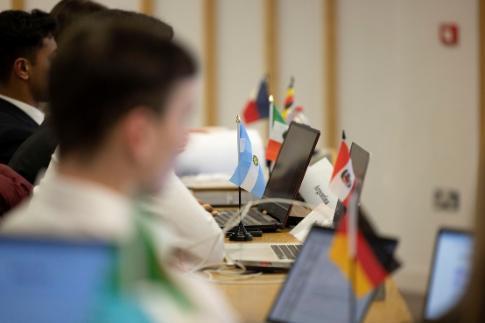Climate Change and Business Sustainability
Overview

This Learning Enhancement project has been funded through SATLE (Strategic Alignment of Teaching and Learning Enhancement) with the support of the National Forum / HEA.
| PROJECT TITLE: | Climate Change and Business Sustainability |
|---|---|
| PROJECT COORDINATOR: | Prof Colm McLaughlin, School of Business |
| COLLABORATORS: | Assoc Prof Andrew Keating, Assoc Prof Julie Byrne, Sheila Harty, Maria Kotzias |
| TARGET AUDIENCE: | The project involved running an innovative module, which was open to MSc students and final year UG students. 90 Students participated. |
Background
There were no modules within the College of Business that focused exclusively on climate change, and very few modules that even addressed climate change. We identified a gap to introduce a specific module on climate change. Additionally, we were aware of a module being run by our CEMS partners at institutions across Europe, which culminated in a two-day role play based on the UNFCCC process. The UCD Smurfit School runs an MSc in International Management as part of the CEMS network, and we were keen to join the CEMS version of this module. Thus, we designed a module based on the CEMS version, whereby we would run a two-day role play held at UCD, and then our CEMS students would also participate in the role play held in May at one of our partner institutions.
Goals
The aim of the project was to design, plan and run an interactive and experiential pilot module for the UCD College of Business students, which deepens their understanding of climate change, the United Nations Framework Convention on Climate Change (UNFCCC), the SDGs and the implications of these for business sustainability. We were aiming to educate our students about climate change and the international agreements on climate change, with a focus on mitigation, adaptation, and climate finance.
Approach
We set up a team at UCD involving staff and students (PhD and MSc) to design the module. Our PhD student attended the CEMS roleplay in Cologne in May 2023 to observe, collect resources and ideas and advise us. In early January 2024, three of our CEMS partners came to Dublin to walk us through their version of the module. At this point, they offered to deliver some of the lectures for us. Maria Kotzias, a PhD student from Cologne who had organised the Cologne event, came on board as part of the team and advised us throughout the project. She delivered two of our lecturers and attended the UCD roleplay in the role of special adviser. The roleplay itself is student-led and run. Students act as working group chairs and staff are very much in the background in an advisory role.
Results
The main deliverable from the project was the successful running of the module in Spring 2024. 55 final year undergraduate students (from a range of College of Business programmes and the BSc Sustainability) and 34 MSc students (from Finance, Renewable Energy and HRM) participated. The overwhelming feedback from students was that this was the best module they had taken at UCD. Comments in the feedback form included:
“The role play was one of the best things I've done in UCD. Really fun and learned so much about climate change, its mitigation and financing, and the problems countries face trying to establish international agreements to suit all agendas.”
“The COP roleplay was such a fantastic experience and gave great insights into international relations and sustainability through active learning.”
“I can confidently say that has been one of the standout modules from the degree. A perfect balance of classroom learning and practical mock conference, I have gained so much from the experience.”
The longer-term impact is that we plan to run the module on an annual basis. Our CEMS students will again participate in the Dublin role play and attend the CEMS role play in Rotterdam.
Resources
Apart from a module outline, there are no specific resources available, but we plan to write up a summary document with tips on running an interactive learning module.